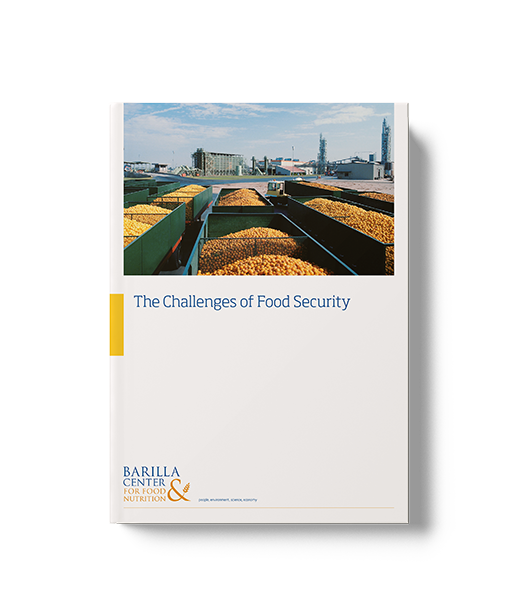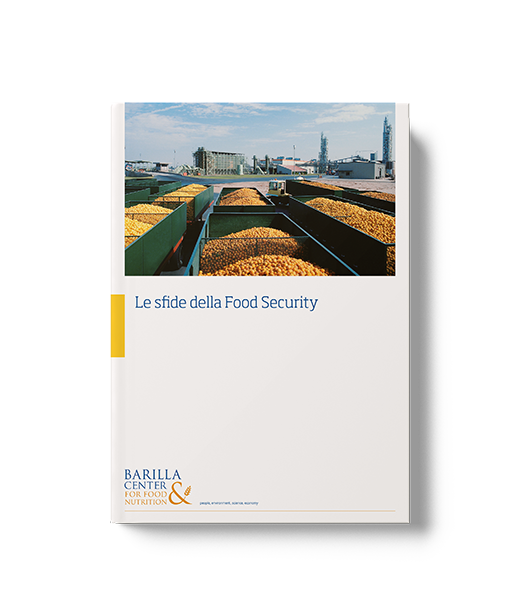
Barilla Center for Food & Nutrition
The Challanges of Food Security
Barilla Center for Food & Nutrition
Managing and governing physical and economic access to healthy, high-quality food—sufficient to meet individuals' nutritional needs—is the most significant challenge society faces today on a global scale.
The study The Challenges of Food Security, conducted by the Barilla Center for Food & Nutrition, was created with the aim of describing the issue of food access from a multidimensional perspective, taking into account the complex system of variables involved.
From a technical-quantitative standpoint, current production capacity is theoretically sufficient to feed the entire global population; however, this does not prevent the persistence and worsening of enormous disparities in access to food, symbolized by the coexistence of 1.019 billion undernourished people and 1.142 billion obese individuals.
From an economic perspective, the root of hunger is poverty, and eradicating it requires tools for fair and sustainable economic development, particularly in the agricultural sector.
From an environmental standpoint, climate change, water scarcity, and soil degradation will have complex impacts on agriculture and its ability to supply food products, as well as serious implications for global food security and ecosystem health.
From a social perspective, food accessibility mainly affects human health (undernutrition and malnutrition weaken individuals' immune systems) and the socio-political dimension (tensions related to access to and control over agricultural resources, and migratory phenomena caused by poor living conditions).
The main challenges that political systems will have to face lie in the ability to find a balance between economic development, environmental protection, and food security, as well as between diverging local/national and international interests.
Executive summary
1. The reference scenario
1.1 The current world crisis
1.2 Food Security: main aspects and long-term problem areas
1.3 Four perspectives on Food Security
1.3.1 Economics
1.3.2 Politics
1.3.3 Environment, natural resources and food production
1.3.4 Society
2. Food Security and global governance
2.1 Geopolitics of the global food crisis: significant variables
2.2 Obtaining Food Security throughout the world: models, orientations and main recommendations from a number of key international bodies
2.2.1 Declaration of the High Level Conference on World Food Security: short- and medium-to-long term goals
2.2.2 The twin track approach and right to food within the context of global food security governance: FAO’s position and proposals
2.2.3 Non-distortionary agricultural support measures: proposals of the High Level Expert Forum
2.2.4 Agricultural policies and food crisis in Africa: perspective of farmers organizations
2.2.5 The Food Security initiative launched by the G8 Summit in Aquila
2.3 Food Security e food safety
2.4 Summary remarks: challenges and possible answers
3. The food crisis and the failure of market mechanism 3.1 The food crisis
3.2 The food crisis and the failure of market mechanisms: overview of expert analyses
3.3 A proposed synthesis
3.4 Post-crisis world: structural changes in food models and food security in the next twenty years
4. Recommendations
4.1 Areas of intervention
References
Il Barilla Center for Food & Nutrition (BCFN) è un think tank multidisciplinare fondato nel 2009 all’interno della Fondazione Barilla e trasformato in fondazione autonoma nel 2014, con l’obiettivo di raccogliere e analizzare conoscenze sulla filiera alimentare per proporre soluzioni sostenibili e salutari. Con sede a Parma e finanziato dal Gruppo Barilla, riunisce esperti in nutrizione, economia, scienze ambientali e sociologia per studiare le dinamiche di produzione, consumo e spreco alimentare.
Organizza eventi internazionali, tra cui il BCFN Forum, workshop e webinar, coinvolgendo istituzioni, università e ONG in partnership strategiche. Offre programmi di formazione e comunicazione, webinar e risorse online per sensibilizzare consumatori e operatori del settore sulle sfide nutrizionali e ambientali. Grazie a collaborazioni con FAO, IFAD e altre agenzie internazionali, il BCFN contribuisce a definire linee guida e policy per una dieta sana, equa e rispettosa del pianeta.
